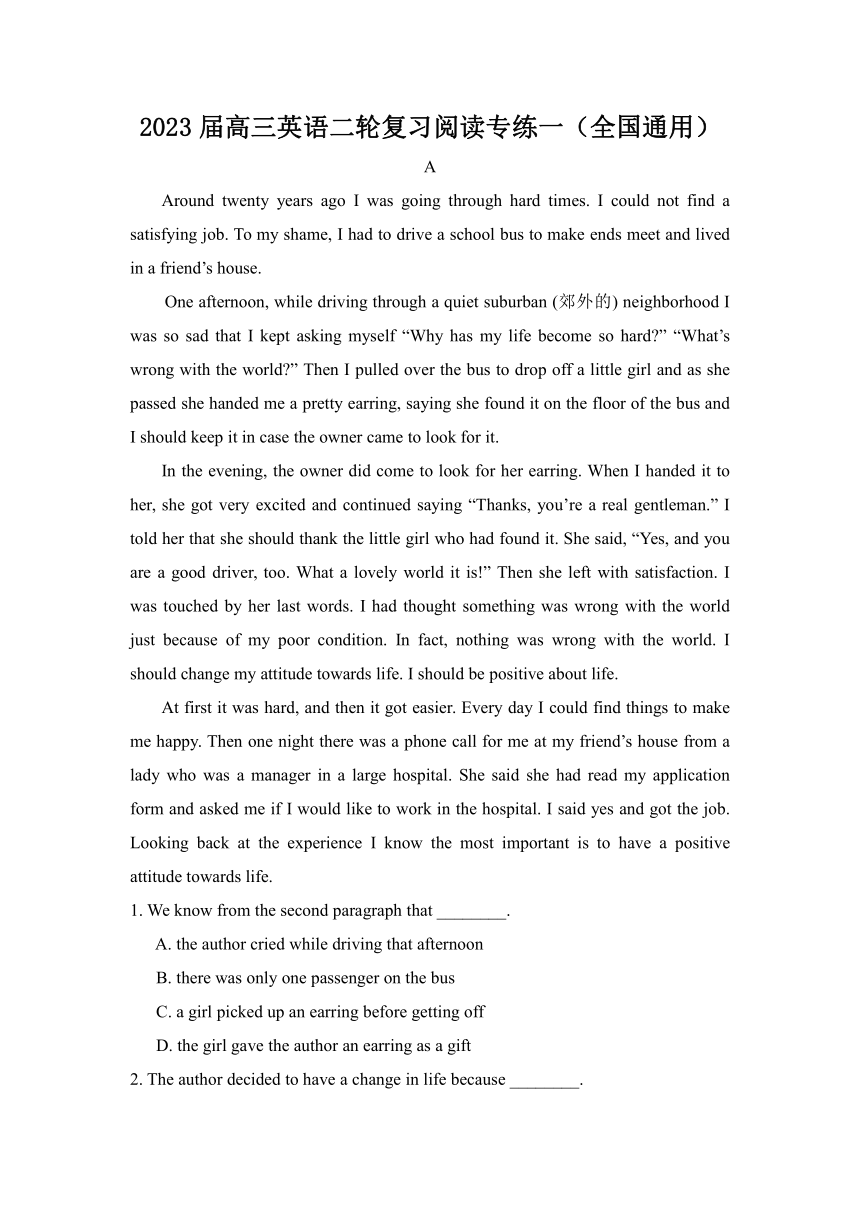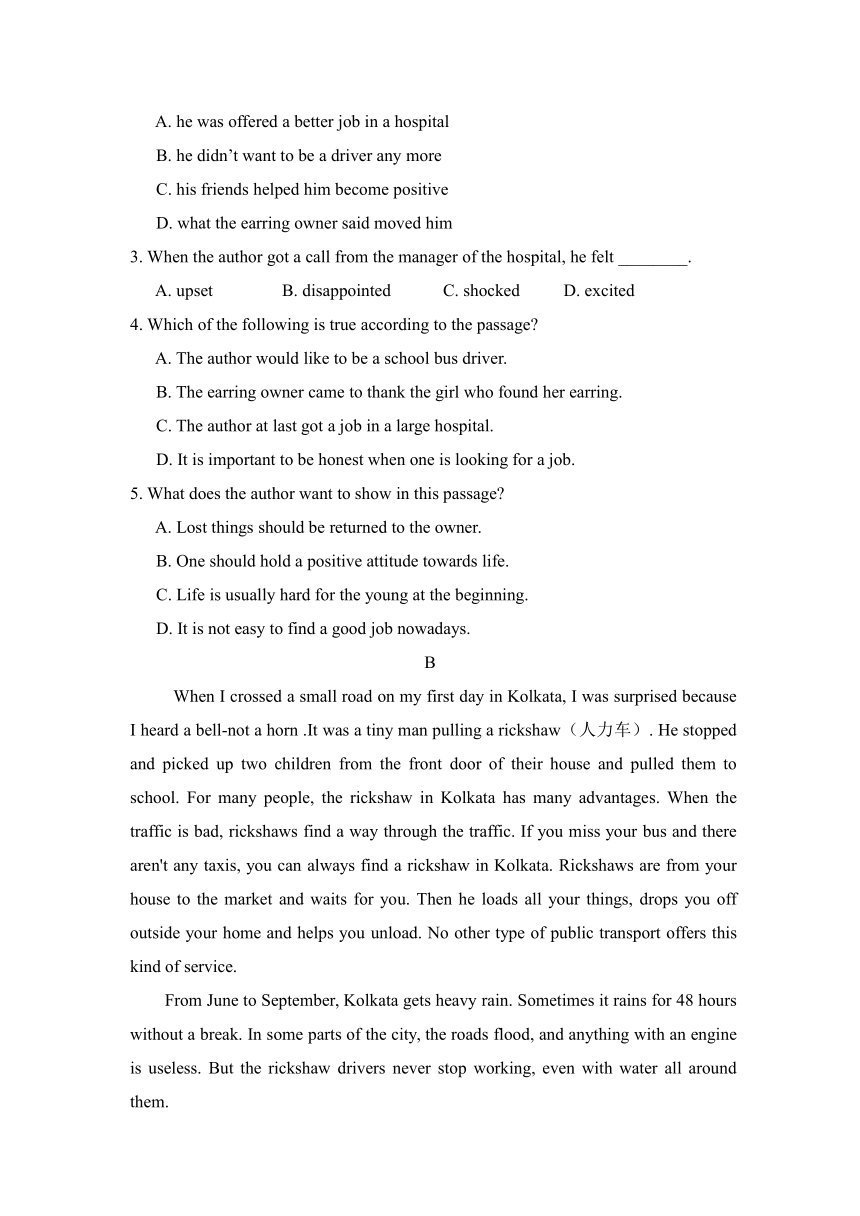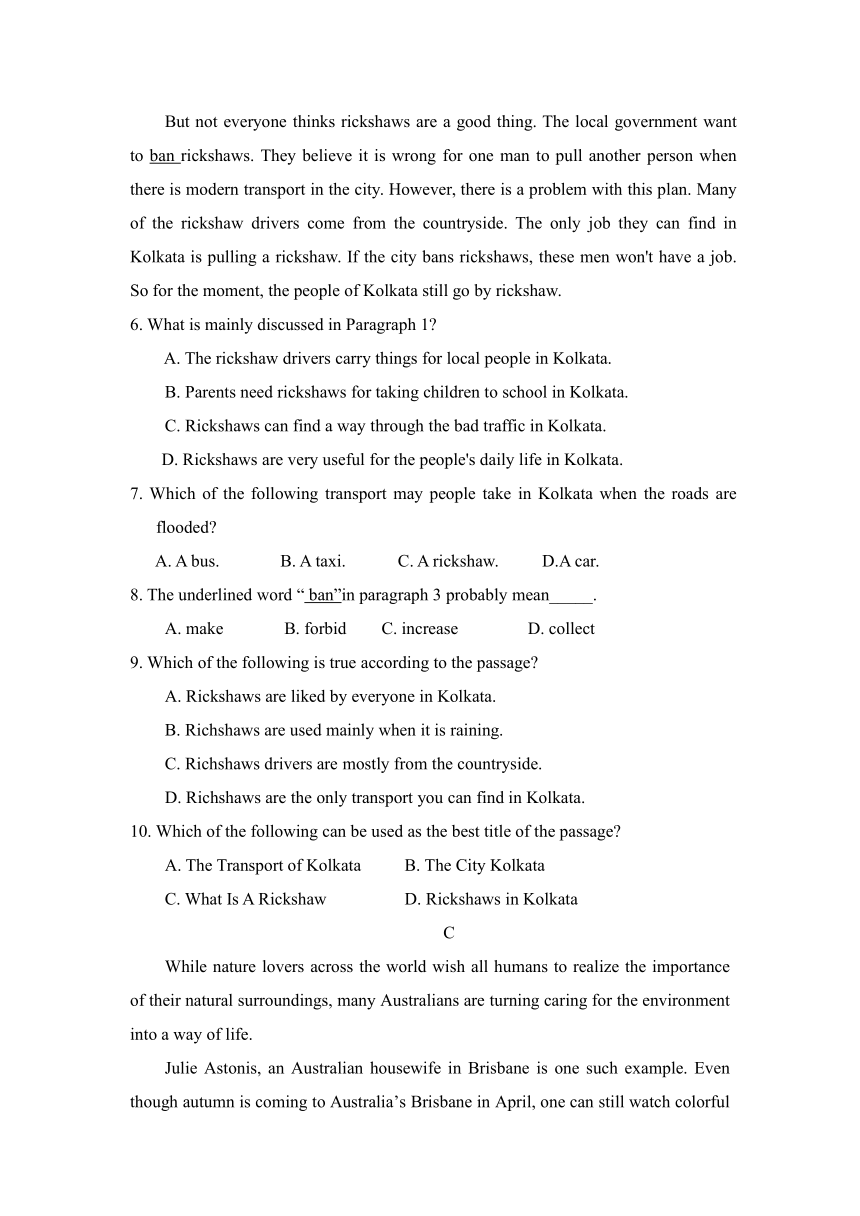2023届高三英语二轮复习阅读专练一(全国通用)(含答案)
文档属性
| 名称 | 2023届高三英语二轮复习阅读专练一(全国通用)(含答案) |  | |
| 格式 | zip | ||
| 文件大小 | 15.9KB | ||
| 资源类型 | 教案 | ||
| 版本资源 | 通用版 | ||
| 科目 | 英语 | ||
| 更新时间 | 2023-05-08 14:36:21 | ||
图片预览



文档简介
2023届高三英语二轮复习阅读专练一(全国通用)
A
Around twenty years ago I was going through hard times. I could not find a satisfying job. To my shame, I had to drive a school bus to make ends meet and lived in a friend’s house.
One afternoon, while driving through a quiet suburban (郊外的) neighborhood I was so sad that I kept asking myself “Why has my life become so hard ” “What’s wrong with the world ” Then I pulled over the bus to drop off a little girl and as she passed she handed me a pretty earring, saying she found it on the floor of the bus and I should keep it in case the owner came to look for it.
In the evening, the owner did come to look for her earring. When I handed it to her, she got very excited and continued saying “Thanks, you’re a real gentleman.” I told her that she should thank the little girl who had found it. She said, “Yes, and you are a good driver, too. What a lovely world it is!” Then she left with satisfaction. I was touched by her last words. I had thought something was wrong with the world just because of my poor condition. In fact, nothing was wrong with the world. I should change my attitude towards life. I should be positive about life.
At first it was hard, and then it got easier. Every day I could find things to make me happy. Then one night there was a phone call for me at my friend’s house from a lady who was a manager in a large hospital. She said she had read my application form and asked me if I would like to work in the hospital. I said yes and got the job. Looking back at the experience I know the most important is to have a positive attitude towards life.
1. We know from the second paragraph that ________.
A. the author cried while driving that afternoon
B. there was only one passenger on the bus
C. a girl picked up an earring before getting off
D. the girl gave the author an earring as a gift
2. The author decided to have a change in life because ________.
A. he was offered a better job in a hospital
B. he didn’t want to be a driver any more
C. his friends helped him become positive
D. what the earring owner said moved him
3. When the author got a call from the manager of the hospital, he felt ________.
A. upset B. disappointed C. shocked D. excited
4. Which of the following is true according to the passage
A. The author would like to be a school bus driver.
B. The earring owner came to thank the girl who found her earring.
C. The author at last got a job in a large hospital.
D. It is important to be honest when one is looking for a job.
5. What does the author want to show in this passage
A. Lost things should be returned to the owner.
B. One should hold a positive attitude towards life.
C. Life is usually hard for the young at the beginning.
D. It is not easy to find a good job nowadays.
B
When I crossed a small road on my first day in Kolkata, I was surprised because I heard a bell-not a horn .It was a tiny man pulling a rickshaw(人力车). He stopped and picked up two children from the front door of their house and pulled them to school. For many people, the rickshaw in Kolkata has many advantages. When the traffic is bad, rickshaws find a way through the traffic. If you miss your bus and there aren't any taxis, you can always find a rickshaw in Kolkata. Rickshaws are from your house to the market and waits for you. Then he loads all your things, drops you off outside your home and helps you unload. No other type of public transport offers this kind of service.
From June to September, Kolkata gets heavy rain. Sometimes it rains for 48 hours without a break. In some parts of the city, the roads flood, and anything with an engine is useless. But the rickshaw drivers never stop working, even with water all around them.
But not everyone thinks rickshaws are a good thing. The local government want to ban rickshaws. They believe it is wrong for one man to pull another person when there is modern transport in the city. However, there is a problem with this plan. Many of the rickshaw drivers come from the countryside. The only job they can find in Kolkata is pulling a rickshaw. If the city bans rickshaws, these men won't have a job. So for the moment, the people of Kolkata still go by rickshaw.
6. What is mainly discussed in Paragraph 1
A. The rickshaw drivers carry things for local people in Kolkata.
B. Parents need rickshaws for taking children to school in Kolkata.
C. Rickshaws can find a way through the bad traffic in Kolkata.
D. Rickshaws are very useful for the people's daily life in Kolkata.
7. Which of the following transport may people take in Kolkata when the roads are flooded
A. A bus. B. A taxi. C. A rickshaw. D.A car.
8. The underlined word “ ban”in paragraph 3 probably mean_____.
A. make B. forbid C. increase D. collect
9. Which of the following is true according to the passage
A. Rickshaws are liked by everyone in Kolkata.
B. Richshaws are used mainly when it is raining.
C. Richshaws drivers are mostly from the countryside.
D. Richshaws are the only transport you can find in Kolkata.
10. Which of the following can be used as the best title of the passage
A. The Transport of Kolkata B. The City Kolkata
C. What Is A Rickshaw D. Rickshaws in Kolkata
C
While nature lovers across the world wish all humans to realize the importance of their natural surroundings, many Australians are turning caring for the environment into a way of life.
Julie Astonis, an Australian housewife in Brisbane is one such example. Even though autumn is coming to Australia’s Brisbane in April, one can still watch colorful blooming(盛开的)flowers in Julie’s little garden, as she tells that in her community(社区), “Each of us has a beautiful yard. The whole community, from children to elderly people, takes care of the environment as if they are taking care of their own garden.
“Gardening is the most popular club in our community, ”she says. “A lot of retired people don’t just regularly organize gardening lectures, but also personally visit families in the community to provide gardening training. So you can see that flowers continue to blossom in our gardens throughout the year.”
Talking about her people’s sense of care for the environment, Julie says when people in the community take along their dog, they always carry a garbage bag to deal with the dog’s waste. “In our community, you will never have the experience of stepping on the dirty waste while you are walking on the grass,” says Julie with a smile. “Taking care of the dog’s waste can also help to develop children’s sense of responsibility!”
As to protecting water resources(资源), the Australian government has made strict rules for families. Julie says, “We certainly would not use tap water to water the flowers!” She says almost every family in her community has a huge tank(水箱) used to store rainwater, which is later used as the recollect of all outdoor water use, connect the water tank with their toilets.
11. From the first three paragraphs we learn that ________.
A. it’s not easy to keep a garden without proper training
B. Julie’s community has a deep sense of caring for nature
C. gardening is popular in most parts of Australia
D. April is a great time for people to enjoy flowers
12. What do we know about Julie from this passage
A. She is quite in favor of raising a dog.
B. She once stepped on a dog’s waste.
C. She takes pride in her community .
D. She finds it terrible to walk on the grass.
13. From what Julie says in the last paragraph, we know________ .
A. rainwater is not the best resource
B. her community owns a public tank
C. it is not necessary to water flowers very often
D. her community makes full use of resources
14. What would be the best title for the passage
A. How Australians lead their life B. How Australians save resources
C. Love nature, the Australian way D. Protect nature, a must of life
参考答案:
1-5CDDCB 6-10DCBCD 11-14 BCDC
A
Around twenty years ago I was going through hard times. I could not find a satisfying job. To my shame, I had to drive a school bus to make ends meet and lived in a friend’s house.
One afternoon, while driving through a quiet suburban (郊外的) neighborhood I was so sad that I kept asking myself “Why has my life become so hard ” “What’s wrong with the world ” Then I pulled over the bus to drop off a little girl and as she passed she handed me a pretty earring, saying she found it on the floor of the bus and I should keep it in case the owner came to look for it.
In the evening, the owner did come to look for her earring. When I handed it to her, she got very excited and continued saying “Thanks, you’re a real gentleman.” I told her that she should thank the little girl who had found it. She said, “Yes, and you are a good driver, too. What a lovely world it is!” Then she left with satisfaction. I was touched by her last words. I had thought something was wrong with the world just because of my poor condition. In fact, nothing was wrong with the world. I should change my attitude towards life. I should be positive about life.
At first it was hard, and then it got easier. Every day I could find things to make me happy. Then one night there was a phone call for me at my friend’s house from a lady who was a manager in a large hospital. She said she had read my application form and asked me if I would like to work in the hospital. I said yes and got the job. Looking back at the experience I know the most important is to have a positive attitude towards life.
1. We know from the second paragraph that ________.
A. the author cried while driving that afternoon
B. there was only one passenger on the bus
C. a girl picked up an earring before getting off
D. the girl gave the author an earring as a gift
2. The author decided to have a change in life because ________.
A. he was offered a better job in a hospital
B. he didn’t want to be a driver any more
C. his friends helped him become positive
D. what the earring owner said moved him
3. When the author got a call from the manager of the hospital, he felt ________.
A. upset B. disappointed C. shocked D. excited
4. Which of the following is true according to the passage
A. The author would like to be a school bus driver.
B. The earring owner came to thank the girl who found her earring.
C. The author at last got a job in a large hospital.
D. It is important to be honest when one is looking for a job.
5. What does the author want to show in this passage
A. Lost things should be returned to the owner.
B. One should hold a positive attitude towards life.
C. Life is usually hard for the young at the beginning.
D. It is not easy to find a good job nowadays.
B
When I crossed a small road on my first day in Kolkata, I was surprised because I heard a bell-not a horn .It was a tiny man pulling a rickshaw(人力车). He stopped and picked up two children from the front door of their house and pulled them to school. For many people, the rickshaw in Kolkata has many advantages. When the traffic is bad, rickshaws find a way through the traffic. If you miss your bus and there aren't any taxis, you can always find a rickshaw in Kolkata. Rickshaws are from your house to the market and waits for you. Then he loads all your things, drops you off outside your home and helps you unload. No other type of public transport offers this kind of service.
From June to September, Kolkata gets heavy rain. Sometimes it rains for 48 hours without a break. In some parts of the city, the roads flood, and anything with an engine is useless. But the rickshaw drivers never stop working, even with water all around them.
But not everyone thinks rickshaws are a good thing. The local government want to ban rickshaws. They believe it is wrong for one man to pull another person when there is modern transport in the city. However, there is a problem with this plan. Many of the rickshaw drivers come from the countryside. The only job they can find in Kolkata is pulling a rickshaw. If the city bans rickshaws, these men won't have a job. So for the moment, the people of Kolkata still go by rickshaw.
6. What is mainly discussed in Paragraph 1
A. The rickshaw drivers carry things for local people in Kolkata.
B. Parents need rickshaws for taking children to school in Kolkata.
C. Rickshaws can find a way through the bad traffic in Kolkata.
D. Rickshaws are very useful for the people's daily life in Kolkata.
7. Which of the following transport may people take in Kolkata when the roads are flooded
A. A bus. B. A taxi. C. A rickshaw. D.A car.
8. The underlined word “ ban”in paragraph 3 probably mean_____.
A. make B. forbid C. increase D. collect
9. Which of the following is true according to the passage
A. Rickshaws are liked by everyone in Kolkata.
B. Richshaws are used mainly when it is raining.
C. Richshaws drivers are mostly from the countryside.
D. Richshaws are the only transport you can find in Kolkata.
10. Which of the following can be used as the best title of the passage
A. The Transport of Kolkata B. The City Kolkata
C. What Is A Rickshaw D. Rickshaws in Kolkata
C
While nature lovers across the world wish all humans to realize the importance of their natural surroundings, many Australians are turning caring for the environment into a way of life.
Julie Astonis, an Australian housewife in Brisbane is one such example. Even though autumn is coming to Australia’s Brisbane in April, one can still watch colorful blooming(盛开的)flowers in Julie’s little garden, as she tells that in her community(社区), “Each of us has a beautiful yard. The whole community, from children to elderly people, takes care of the environment as if they are taking care of their own garden.
“Gardening is the most popular club in our community, ”she says. “A lot of retired people don’t just regularly organize gardening lectures, but also personally visit families in the community to provide gardening training. So you can see that flowers continue to blossom in our gardens throughout the year.”
Talking about her people’s sense of care for the environment, Julie says when people in the community take along their dog, they always carry a garbage bag to deal with the dog’s waste. “In our community, you will never have the experience of stepping on the dirty waste while you are walking on the grass,” says Julie with a smile. “Taking care of the dog’s waste can also help to develop children’s sense of responsibility!”
As to protecting water resources(资源), the Australian government has made strict rules for families. Julie says, “We certainly would not use tap water to water the flowers!” She says almost every family in her community has a huge tank(水箱) used to store rainwater, which is later used as the recollect of all outdoor water use, connect the water tank with their toilets.
11. From the first three paragraphs we learn that ________.
A. it’s not easy to keep a garden without proper training
B. Julie’s community has a deep sense of caring for nature
C. gardening is popular in most parts of Australia
D. April is a great time for people to enjoy flowers
12. What do we know about Julie from this passage
A. She is quite in favor of raising a dog.
B. She once stepped on a dog’s waste.
C. She takes pride in her community .
D. She finds it terrible to walk on the grass.
13. From what Julie says in the last paragraph, we know________ .
A. rainwater is not the best resource
B. her community owns a public tank
C. it is not necessary to water flowers very often
D. her community makes full use of resources
14. What would be the best title for the passage
A. How Australians lead their life B. How Australians save resources
C. Love nature, the Australian way D. Protect nature, a must of life
参考答案:
1-5CDDCB 6-10DCBCD 11-14 BCDC
